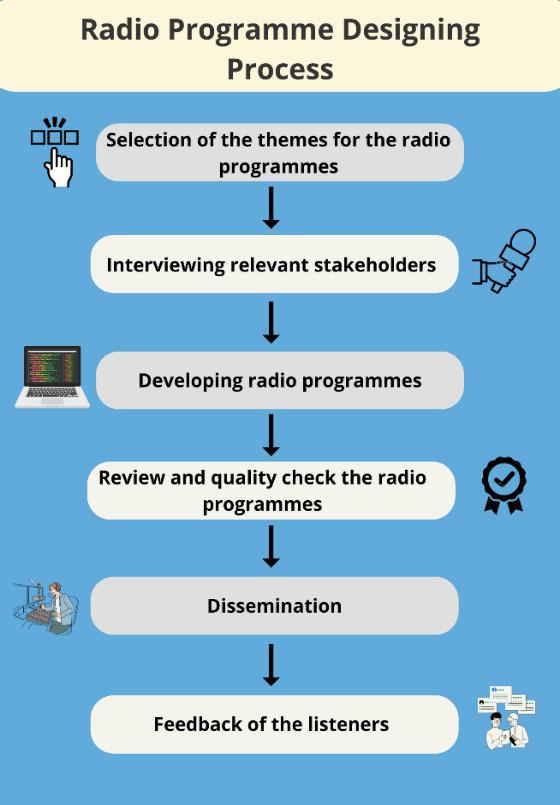Country: India
SDG Region: Central and Southern Asia
Sector: Public, communications, media
Keywords: Public engagement, local adaptation, multi-stakeholder engagement, public access to information, climate communication
In the community of Madhya Pradesh in the Bundelkhand region in India, a community-owned radio station named Radio Bundelkhand 90.4 FM is empowering the local community and promoting action for change.
Community Radio Station: Sustainable Farming Through Broadcasting
The first of its kind in the community, and the second community radio station in India, the station is run by Development Alternatives. Radio Bundelkhand plays an essential role in bringing social long-term improvements in the Bundelkhand region. Since the beginning, the radio station has aimed to give a voice to the people in the region. It has broadcasted for women, youth, farmers, and disadvantaged groups and reaches more than 120 communities within a 15-kilometer radius. The radio station is a popular, cost-effective communication medium that uses a participatory and collaborative strategy to empower and promote action for change.
The community of Bundlekhand, where the radio station is located, is in one of the poorest regions in India. Large areas of the land are not cultivable due to lack of water, poor soil quality, and soil erosion, which means that farming activities in the region are highly vulnerable. The area has low literacy rates, which makes it difficult for knowledge about climate change risk to be shared with the local community.
This case study explores the power of radio climate change communication campaigns to offer climate solutions to marginalized rural agricultural communities.

“Through community radio, vital dialogues are facilitated among communities, scientists and policymakers on climate change issues, strengthening community knowledge and voices on the impacts.”
Radio Bundelkhand has had climate change programming since 2008, and a team of four people are dedicated to addressing the community’s climate change and agriculture issues. The station’s communication model uses community radio reporters to act as a bridge between the farming community, and scientists and policymakers. To develop climate change programming, the radio station interviews local community members to understand their doubts, perceptions, and challenges related to climate change. The 15-20 minute-long radio shows are broadcast at convenient times for rural communities. Programming uses an edutainment approach, and reporters ensure abstract climate change concepts are communicated using easily understandable messages, with local examples based on real-life experiences. The station shares listeners’ feedback with relevant scientists and government authorities, and reporters address the questions in subsequent programming.
This case study compiled responses from radio reporters, climate change experts, and radio listeners. The reporters highlighted that when they started to talk with the community about climate change they noticed that people were not familiar with it. However, interviews and focus groups with listeners from the community showed that the radio program enhanced their knowledge and provided ideas and solutions to farming and day-to-day issues affected by climate change.

Experts mentioned that radio reporters frequently communicate with them to collect the information through phone calls, and online and in-person meetings, and also sometimes they invite them to attend talk shows and live calls.
“The activities of radio Bundelkhand have given further meaning to decentralisation. An appropriate communication medium has been created to facilitate an interface between scientists-knowledge-community, especially for the people in the operational districts of Bundelkhand Radio.”
The researchers found that Radio Bundelkhand not only improves community awareness and disseminates information about climate change. The station also provides capacity-building training to radio reporters to improve their skills and knowledge. For example, the journalists participate in workshops to improve their journalistic skills and teach them how to make effective climate change stories and programmes. Reporters’ understanding of local climate change issues in their communities also increases through engaging with scientists and policymakers.
Before the radio station was created, Bundelkhend had no space for local people to be involved in media and there was no platform for the people in rural areas to express their worries. Over the years, Radio Bundelkhand has evolved into a people’s radio station that plays a vital role in bridging between scientists, policymakers, and the community. This radio station’s climate communication model is a tool for community development. The important work being done by Radio Bundelkhand shows how broadscale communication can empower rural and remote populations to take climate action.

The MECCE Project is grateful to Development Alternatives for conducting this case study and to
Vaishali Kanojia, Deputy Manager- Agriculture and Climate Change Communication, Development Alternatives
And
Kirandeep Kaur, Project Executive – Community Radio and Communications, Radio Bundelkhand


INTERACTIVE DATA PLATFORM
Our interactive data platform provides users with the ability to analyze and visualize the MECCE Project’s case studies, country profile, and global indicator data.
Learn More about the MECCE Project

DIGITAL LIBRARY
Visit our open access repository for project materials, including policy briefs, factsheets, guidelines, infographics, reports, and videos.

GLOBAL CCE BLOG
We discuss emerging issues in climate communication and education to respond to the area's rapidly evolving policy environment and public discourse.

REGIONAL HUBS
Learn how to join our growing global network, which supports regional input and action on climate communication and education.


